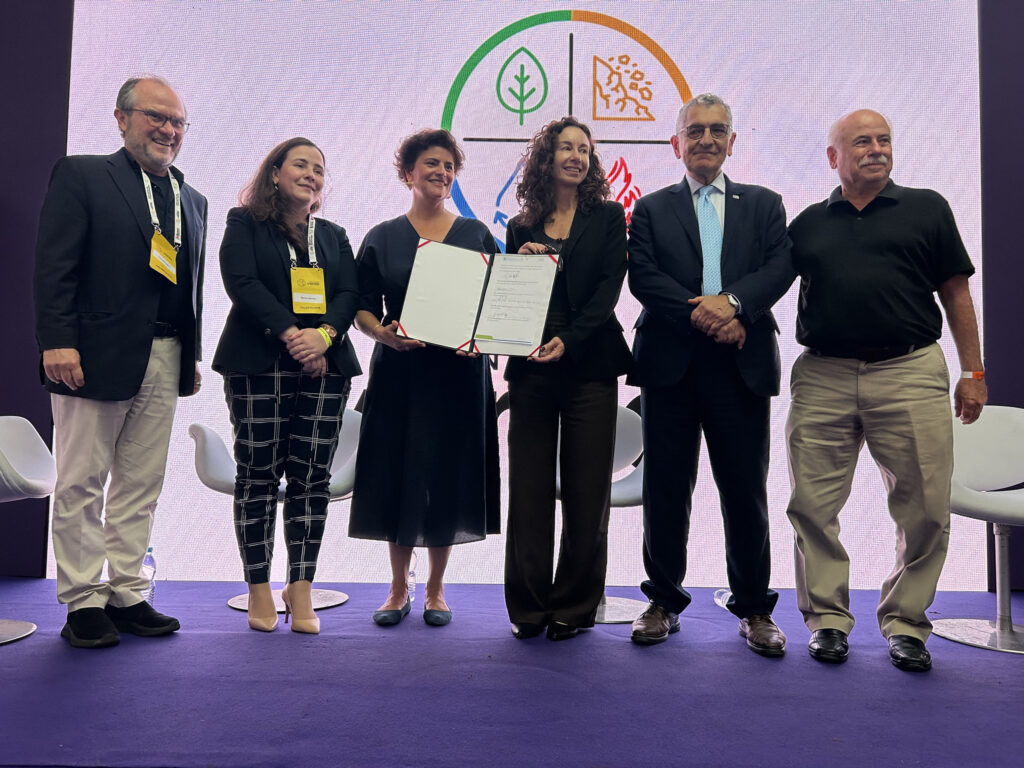The signing ceremony took place during the Agenda SP+Verde event, part of ETRI 2025, bringing together representatives from USP, Equinor, and the São Paulo State Government.

The agreement for the CABRA (Carbon Storage in Brazilian Basalts) project marks a new step for Brazil in its energy transition and in advancing carbon capture and storage (CCS) technologies. Held on Wednesday (Nov 5) in São Paulo, the event was part of the 8th Energy Transition Research & Innovation Conference (ETRI), which this year was integrated with the
SP+Verde Summit, organized by the São Paulo State Government.
With an investment of around R$10 million, the project is a partnership between Equinor Brazil and the Research Centre for Greenhouse Gas Innovation (RCGI-USP). The R&D initiative will be coordinated by Professor Colombo Celso Gaeta Tassinari, from the Institute of Energy and Environment (IEE-USP), and will investigate the potential of basalt formations in the Paraná Basin, especially the Serra Geral Formation, for mineralized CO₂ storage from bioethanol plants.
During the ceremony, Professor Julio Meneghini, RCGI’s Scientific Director, highlighted the pioneering nature of the research and the importance of cooperation among academia, government, and industry.
“Thanks to Equinor, we will be able to thoroughly study the potential of Brazilian basalts for carbon storage. This is an example for Brazil and the world of how science can contribute to a more sustainable future,” he said.
Representing Equinor Brazil, Cláudia Brum, Vice President for Strategy and Business Development, emphasized that the project reinforces the company’s commitment to low-carbon solutions and new technologies.
“Equinor has 30 years of experience in offshore CO₂ storage, but none yet in basalts. CABRA is an important step toward understanding the CO₂ mineralization potential in the Brazilian context — and an opportunity to generate knowledge that could lead to negative emissions in the future,” she explained.
She also noted that the project adds to the company’s record of sustainable initiatives in Brazil, mentioning the start of production at the Bacalhau field in October, with 220,000 barrels per day and half the carbon intensity of similar fields worldwide.
Vahan Agopyan, São Paulo’s Secretary for Science, Technology, and Innovation, stressed that there is no sustainability without science, technology, and innovation — and vice versa.
“Projects like this symbolize the synergy we need to tackle global challenges,” he said.
Marisa Maia de Barros, Deputy Secretary for Energy and Mining, representing Secretary Natália Resende Andrade Ávila, highlighted the importance of the project within São Paulo’s climate and energy strategy, whose energy matrix consists of 60% renewable sources, compared to 50% in Brazil and 15% in OECD countries.
“This is a concrete example of how science, innovation, and industry move together toward a just energy transition. Projects like CABRA show that we are preparing today for the solutions the future will demand,” she stated.
The CABRA project will assess the technical, geological, and economic feasibility of integrating bioethanol production with geological CO₂ storage. In addition to geological characterization studies, engineering assessments will be carried out to design a potential pilot project, evaluating injectivity, storage capacity, and CO₂ mineralization time in rock formations.
For RCGI, CABRA strengthens USP’s commitment to scientific and technological advancement in decarbonization.
“The partnership with Equinor combines industrial experience with academic excellence, expanding Brazil’s capacity to develop solutions with global impact,” Meneghini concluded.
The ceremony was also attended by Andrea Achoa, R&D Manager at Equinor Brazil, Professor Colombo Celso Gaeta Tassinari, project coordinator, RCGI researchers, and representatives of the São Paulo State Government.
